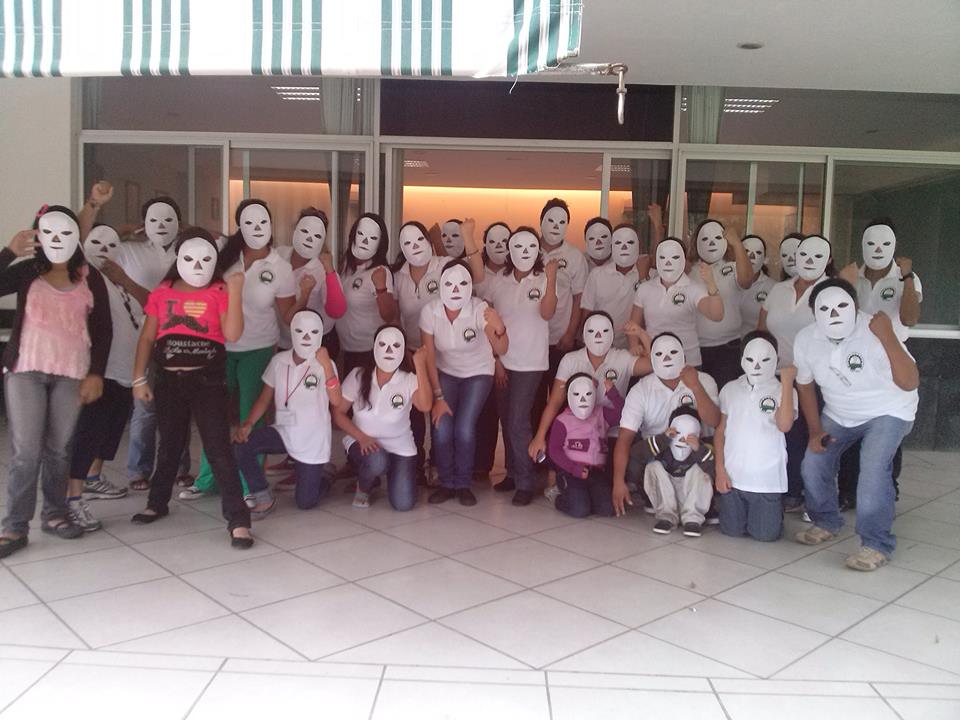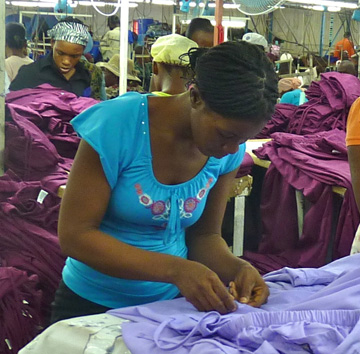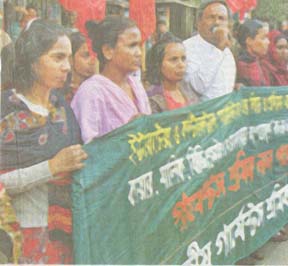WELCOME TO THE ARCHIVE (1994-2014) OF THE MAQUILA SOLIDARITY NETWORK. For current information on our ongoing work on the living wage, women's labour rights, freedom of association, corporate accountability and Bangladesh fire and safety, please visit our new website, launched in October, 2015: www.maquilasolidarity.org
 (Photo: CETIEN)
(Photo: CETIEN)
In August, the Centre for Reflection and Labour Action (CEREAL in Spanish)
in Guadalajara, Mexico released its 2012 report on labour issues and cases
of worker rights violations in the country's electronics manufacturing industry.
The report highlights the problem of employer protection contracts signed
between hundreds of electronics manufacturing firms and unelected
union leaders.
New iPhone, old abuses
14 days to go: Make the next Olympics fully sweat-free
Can National Competitiveness Strategies include Decent Work?
 Shortly after a new union was formed last September in Haiti's growing apparel manufacturing sector, six of the seven workers who serve on the union's executive committee were fired or forced to resign by the factories where they worked. But we're pleased to report that thanks to concerted efforts by Haitian and international labour rights groups, all but one of the workers have now been reinstated and are back at work.
Shortly after a new union was formed last September in Haiti's growing apparel manufacturing sector, six of the seven workers who serve on the union's executive committee were fired or forced to resign by the factories where they worked. But we're pleased to report that thanks to concerted efforts by Haitian and international labour rights groups, all but one of the workers have now been reinstated and are back at work.
 Just over a year ago a fire at That's It Sportswear garment factory in Bangladesh caused the death of 29 workers, and injured a number of others, eleven of them seriously. Sadly, in December 2011 two more workers perished and over fifty were injured in a stampede triggered by panic after a boiler explosion at the Bangladesh factory Eurotex. There is an urgent need to establish a credible programme to address the serious safety issues that remain endemic in the readymade garment industry.
Just over a year ago a fire at That's It Sportswear garment factory in Bangladesh caused the death of 29 workers, and injured a number of others, eleven of them seriously. Sadly, in December 2011 two more workers perished and over fifty were injured in a stampede triggered by panic after a boiler explosion at the Bangladesh factory Eurotex. There is an urgent need to establish a credible programme to address the serious safety issues that remain endemic in the readymade garment industry.
Precarious work, and in particular the abuse of short-term employment contracts and employment agencies, is recognized as a growing problem in the garment industry world-wide, and one that is increasing workers' vulnerability and limiting the exercise of freedom of association. MSN worked with national, regional and international counterparts to address this dangerous shift toward precarious work and the negative consequences for workers and their communities.
The apparel industry was widely hailed in some circles as a vital economic opportunity for Haiti, particularly after the devastating earthquake which hit the country in January 2010. Although the creation of approximately 26,000 jobs in the country is certainly welcome, the full benefits of those jobs will only be felt if the workers have access to their legal rights, including the right to form unions and bargain collectively, and are paid a living wage.
 In order to ensure that the power of municipal ethical purchasing policies (EPPs) is effectively used to improve conditions in apparel factories, municipalities should collaborate with other governments and public institutions. MSN believes that Canadian municipalities and possibly provincial governments should establish a Canadian consortium to jointly implement their respective EPPs.
In order to ensure that the power of municipal ethical purchasing policies (EPPs) is effectively used to improve conditions in apparel factories, municipalities should collaborate with other governments and public institutions. MSN believes that Canadian municipalities and possibly provincial governments should establish a Canadian consortium to jointly implement their respective EPPs.